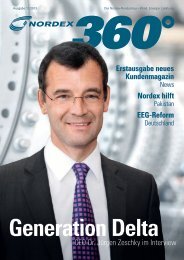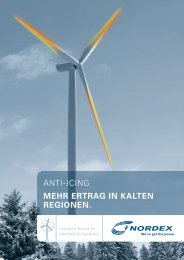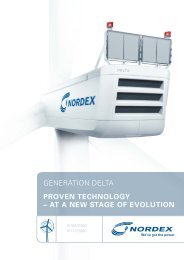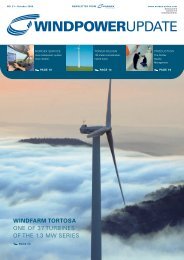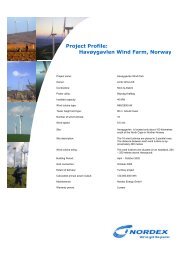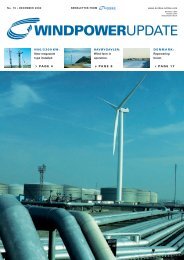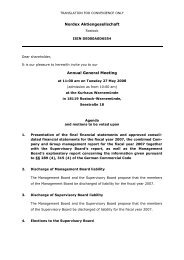OFFERING MEMORANDUM Global Offering of up to ... - Nordex
OFFERING MEMORANDUM Global Offering of up to ... - Nordex
OFFERING MEMORANDUM Global Offering of up to ... - Nordex
You also want an ePaper? Increase the reach of your titles
YUMPU automatically turns print PDFs into web optimized ePapers that Google loves.
<strong>Nordex</strong> AG believes that generating energy using wind power will become an important alternative <strong>to</strong><br />
generating electricity using fossil fuels. The Company attributes this <strong>to</strong> a number <strong>of</strong> fac<strong>to</strong>rs: the fact<br />
that generating electricity using wind power will receive long-term state s<strong>up</strong>port because <strong>of</strong> political<br />
pressure; the fact that prices for fossil fuels will rise due <strong>to</strong> their increasing scarcity; and the fact that<br />
lower prices for wind turbines will cause the costs <strong>of</strong> generating electricity using wind power <strong>to</strong><br />
continue <strong>to</strong> fall. In this regard, the Company believes that the performance <strong>of</strong> turbines will increase,<br />
and wind farms with as many as 20 turbines will be able <strong>to</strong> contribute significantly <strong>to</strong> electricity s<strong>up</strong>ply.<br />
Even <strong>to</strong>day, a <strong>Nordex</strong> N-80 wind turbine in a location with excellent wind conditions (e.g. coastal<br />
regions in Denmark or the UK) can generate <strong>up</strong> <strong>to</strong> 8.5 million kWh per year, while at an equivalent<br />
location in Germany a similar turbine can generate approximately 6.5 million kWh per year. These<br />
figures correspond <strong>to</strong> the average consumption <strong>of</strong> approximately 1,600 and 1,200 households<br />
respectively, or approximately 6,500 <strong>to</strong> approximately 8,500 <strong>to</strong>nnes <strong>of</strong> CO 2 emissions if the same<br />
quantity <strong>of</strong> electricity were <strong>to</strong> be generated by burning coal. (Source: German Wind Energy Association<br />
– 25 Facts)<br />
Regula<strong>to</strong>ry Background<br />
Opportunities for the sale <strong>of</strong> wind turbines produced by the <strong>Nordex</strong> Gro<strong>up</strong> also depend <strong>to</strong> a significant<br />
extent on the relevant legal framework for erecting and operating these facilities in Germany and many<br />
other countries. For example, legal requirements may restrict the erection and operation <strong>of</strong> turbines. In<br />
Germany in particular, legal construction and noise emission requirements must be complied with,<br />
which can mean actual or legal restrictions on erecting or operating wind turbines in certain locations.<br />
On the other hand, certain legal incentives (those provided for by the EU in Germany, for example)<br />
could lead <strong>to</strong> an increased demand for wind turbines. The regula<strong>to</strong>ry framework created by the EU in<br />
Germany, for instance, led <strong>to</strong> a substantial increase in the sale <strong>of</strong> new wind turbines in 2000.<br />
Regula<strong>to</strong>ry Framework for S<strong>up</strong>plying Electricity in<strong>to</strong> Networks and Promoting Renewable Energy<br />
Renewable energy is promoted in line with relevant national laws. S<strong>up</strong>port ranges from regulations on<br />
s<strong>up</strong>plying electricity <strong>to</strong> the network which prescribe fixed prices for electricity generated by renewable<br />
energy sources (e.g. Germany and Spain), tax credits (e.g. US) through <strong>to</strong> green certificate systems (e.g.<br />
Denmark).<br />
Promotion in Germany<br />
In Germany, the Act on Granting Priority <strong>to</strong> Renewable Energies (EEG) dated March 29, 2000, which<br />
s<strong>up</strong>erseded the Stromeinspeisungsgesetz (German Act on S<strong>up</strong>plying Electricity from Renewable<br />
Energies in<strong>to</strong> the Public Grid) dated December 7, 1990 with effect from April 1, 2000, is <strong>of</strong> key<br />
importance <strong>to</strong> the construction <strong>of</strong> facilities for the generation <strong>of</strong> renewable energy. According <strong>to</strong><br />
Section 1 <strong>of</strong> the EEG, the Act aims <strong>to</strong> protect the climate and the environment by enabling the growth<br />
<strong>of</strong> long-term energy s<strong>up</strong>ply and <strong>to</strong> substantially increase the contribution <strong>of</strong> electricity s<strong>up</strong>ply<br />
generated by renewable energy. The European Court <strong>of</strong> Justice has in a judgment <strong>of</strong> March 13, 2001,<br />
held that the German Act on S<strong>up</strong>plying Electricity from Renewable Energies in<strong>to</strong> the Public Grid is not<br />
contrary <strong>to</strong> European Law. The Company therefore believes that it is not likely that the EEG, which<br />
s<strong>up</strong>ersedes that Act is contrary <strong>to</strong> European Law. The Act regulates the s<strong>up</strong>ply <strong>of</strong> and payment for<br />
electricity generated from wind energy and other sources (Section 2 <strong>of</strong> the EEG). In the case <strong>of</strong> such<br />
s<strong>up</strong>ply, the Act requires grid opera<strong>to</strong>rs, i.e. electricity s<strong>up</strong>pliers that operate grids for general s<strong>up</strong>ply, <strong>to</strong><br />
connect plants that generate electricity from renewable energy sources <strong>to</strong> the grid. These s<strong>up</strong>pliers<br />
must purchase electricity and pay the legally stipulated amount as prescribed by Sections 4 <strong>to</strong> 8 <strong>of</strong> the<br />
EEG. Section 7 <strong>of</strong> the EEG applies <strong>to</strong> electricity from wind energy. The Section prescribes a payment <strong>of</strong><br />
DM 0.178 (approximately EUR 0.09) per kWh for a period <strong>of</strong> five years from the date the plant<br />
commences operations. Once this period has expired, the payment requirement becomes subject <strong>to</strong><br />
other regulations, but continues in effect. The minimum payment prescribed by Section 7 (1) <strong>of</strong> the EEG<br />
is reduced by 1.5% each year, starting on January 1, 2002, and applies <strong>to</strong> all plants that commence<br />
operations after such date. A specific regulation is in place for plants located at least three nautical<br />
miles from the coast and which are due <strong>to</strong> continue in operation <strong>up</strong> <strong>to</strong> and including December 31,<br />
29



